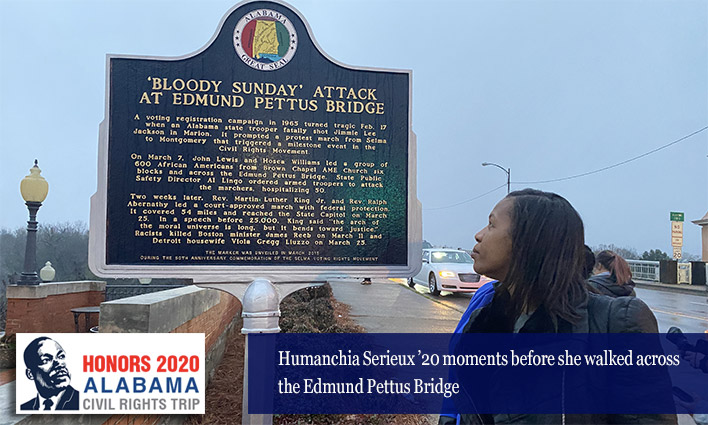
For many of the students going on the Honors 2020 Alabama Civil Rights Trip the ancestral link to the civil rights movement wasn’t direct, even if they themselves identified as black or African-American. As proud immigrants or children of immigrants—hailing from islands in the Caribbean or locations far from the shores of United States—these black Honors students found links within their own ancestral history to the civil rights movement, and they understood the pain of racism on a personal level. To process her feelings about the trip, Humanchia Serieux ’20, an Anthropology major from Brooklyn, New York and the island of Saint Lucia, found herself writing to her great-great grandfather, who was African. In her letter and poem she describes both her pride in the accomplishments of black people, and her horror of their unjust treatment.

Her Letter
Dear Great-great-grandfather
I want to tell you how proud I am to be an educated black woman. The past few days have been a roller coaster of emotions for me on my trip to Alabama, as a member of the John Jay College of Criminal Justice Honors Program. It seems like my life has come full circle. Growing up in Saint Lucia, a country which was part and parcel of the slave trade, and hearing stories about my African bloodline, has always kept me questioning who I really am.
The visit to Alabama has taught me an abundance of history which I believe would sadden you, and yet envelop you with a sense of accomplishment by the black community. I saw the struggles, pain, anguish, communication, death, and jubilation, all compiled in a timeline of the events leading to passing the Civil Rights Act of 1965. Reading the stories depicting young black men being murdered because of trumped up charges took an emotional toll on me. These young men’s lives were taken because a white man was angry that they didn’t call him ‘sir.’ They were killed because they dared to stay out past a curfew only imposed on the black community. They were hunted and murdered because someone wrongfully accused them of raping a white woman. All of these unjust acts of terrorism were because of the color of their skin—which is the same color as mine. The stories left me questioning, why? Aren’t we all humans? Don’t we all deserve to be treated respectfully? Shouldn’t we be able to walk with dignity like our white counterparts?

“Bruised, bloody, and beaten were their bodies, but they marched on for my generation and the others to come.” — Humanchia Serieux
You would be proud of me great-great-grandfather. I walked in the footsteps of those who have gifted me my freedom. I walked across the Edmund Pettus Bridge in Selma, the site of “Bloody Sunday” where your brothers and sisters marched peacefully for their right to vote. Bruised, bloody, and beaten were their bodies, but they marched on for my generation and the others to come.
—Humanchia

Her Poem
Oh Selma,
Yesterday, you seem so sad, yet not broken
plummeted with droplets of blood,
Streaks of marked paths by the dragged bodies of freedom fighters.
Your light was dimmed, yet you still shine,
Your voice was silenced, yet your footprints travel,
Cries sons and daughters, hands outstretched
Free me, you cry
Free me!
Today you stand, as a backdrop of revolution
Stored away from the conscience of those of today
Oblivious of the trials
Reluctance in accepting truth
Hear me, you shout
Hear me!



